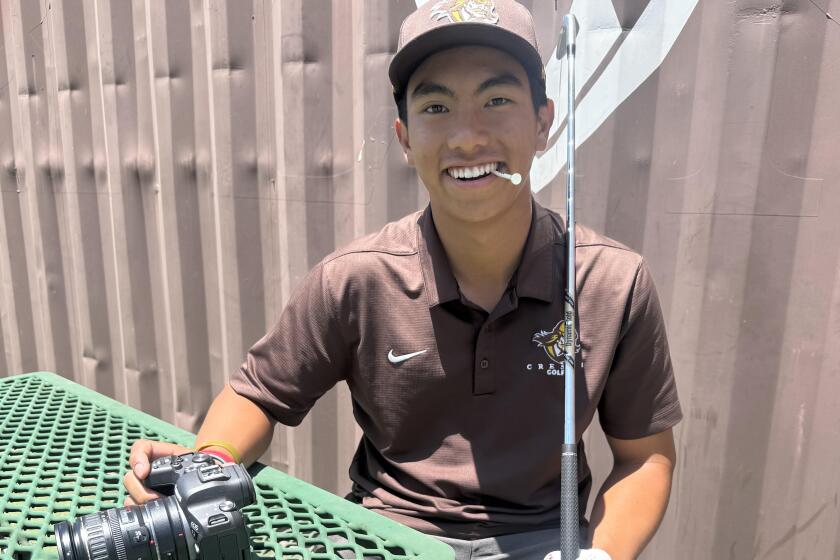His Legacy Merits More Than a Nod of Approval
- Share via
A little statue, a giant statement.
Those showing up at Dodger Stadium tonight will receive the first-ever action figure of Jackie Robinson, sliding into home plate, elbows up, spikes high.
More compelling, though, is what the statue does not do.
Its head does not bobble.
Rachel Robinson, alone in a world of quick-buck heirloom hawkers, will never approve her husband’s image on a bobblehead doll.
Her husband was never one to nod and smile and say yes.
Her husband’s mission was never one of compliance.
Her husband’s memory will not be trivialized.
“I will not allow a bobblehead, ever,” she said Thursday. “It’s not in keeping with his manner.”
And so the most guarded, honored legacy in sports lives, unmarred by hypocrisy, untouched by greed.
Today is the 58th anniversary of the day Jackie Robinson broke baseball’s color barrier and changed America forever.
He is still changing it -- with a scholarship foundation that has helped more than 1,000 minority students attend college at a 97% graduation rate.
He is still doing it with little appreciation -- only two active major leaguers, Derek Jeter and Royce Clayton, have endowed a scholar.
He is still doing it with little support -- the baseball union isn’t even a donor.
He is still doing it with almost zero publicity -- Rachel, 82, refuses most interview requests because she doesn’t want to take his spotlight.
And he is still doing it with quiet defiance.
Before Robinson died of a heart attack at age 53, his hair had long since turned white, his eyesight had been mostly lost, and his strength had virtually disappeared.
Science will blame it on diabetes and heart disease. Baseball folks will tell you it was stress.
In his last public address, at the 1972 World Series shortly before his death, Robinson scolded baseball for its failure to hire an African American manager.
Not surprisingly, Rachel Robinson’s most passionate answer during a brief interview Thursday was about baseball’s failure to recruit more African American players.
Last season African Americans made up only 9% of major league rosters.
Thirty years ago, it was 25%.
Every season, through lack of interest and opportunity, the barrier that Robinson broke seems to regenerate a few more inches.
“I’m very saddened by that fact,” Rachel Robinson said. “Change can occur, but it has to be sustained, and I wish I could see that happen in my lifetime.”
The fight continues, quietly, carefully, with a dignity not afforded the memories of such deceased stars as Ted Williams or Joe DiMaggio.
There are no sibling lawsuits here. There are no tell-all books in the works. There are no cheap ads, or garage sales, and even tonight’s action-figure handout will be the first and last, agreed upon only because Robinson once wore this uniform.
Hoping to strengthen the Robinsons’ connection to the current Dodgers, the McCourt family will annually donate $105,000 in scholarships to 42 students through Robinson’s foundation. But, in what surely must make the foundation’s money folks sigh, every gift is carefully monitored.
“It all goes through Rachel, and she is ... very protective of his memory,” said Della Britton Baeza, president of the Jackie Robinson Foundation. “Everything we do is closely examined before we do it.”
Or, don’t do it.
When somebody once tried to sell Robinson’s 1949 most-valuable-player trophy to the Dodgers, an official called Rachel, who laughed.
“It’s sitting right here on my mantel,” she told them.
She was at the Coliseum on Thursday to participate in the long-overdue unveiling of Robinson’s plaque in the Memorial Hall of Honor.
That the former Pasadena hero and UCLA star is only the 47th plaque on the wall is shameful, but understandable, given the family’s quiet refusal to capitalize on his legacy.
The actual plaque is also typical; Robinson is shown not in a baseball uniform, but in a coat and tie.
“He is more about human rights than about sports,” Rachel said.
Upon receiving an interview request for this column, an official from the foundation directed me not to a sports figure, but to Jennifer Hamilton.
She is a junior biology/premed major at UCLA, a graduate of Hamilton High, who says she could not have attended college without a scholarship.
She was awarded one in the name of the most influential baseball player in history ... even though she understood not one stitch about baseball.
“Have I ever played catch before?” she said. “You mean, with a mitten?”
When asked about last year’s World Series, she laughed.
“I know New York lost, but I don’t know who beat them,” she said. “I was studying.”
Yet she says she understands Robinson, if only because she is African American at a school where her ethnic group makes up less than 5% of the student body.
“Because of what Jackie Robinson did, every day, you have a chance to move beyond what people might think of you,” she said. “Because of what he did, my opportunities can be limitless.”
Limitless, like the stare of the sliding young man in tonight’s little statue. His head eternally locked. His vision forever firm.
Bill Plaschke can be reached at bill.plaschke@latimes.com. To read previous columns by Plaschke, go to latimes.com/plaschke.
More to Read
Go beyond the scoreboard
Get the latest on L.A.'s teams in the daily Sports Report newsletter.
You may occasionally receive promotional content from the Los Angeles Times.











